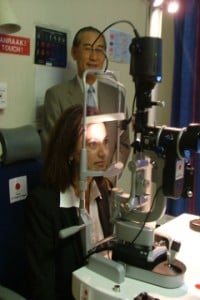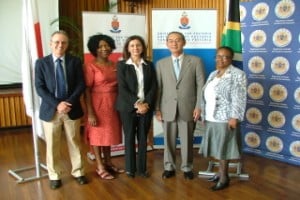Posted on March 30, 2011
The machine is a microscope fitted with a camera, attached to a chair and it will be used to examine eye cataract in the outpatients at the hospital before a recommendation for an eye operation can be made.
The University of Pretoria through its Department of Ophthalmology and the Gauteng Department of Health formed a Public Private Partnership to perform cataract surgery at a district hospital, Pretoria West Hospital – Vision 2020 Clinic. They serve a large community of Tshwane and the surrounding areas in Gauteng Province.
Vision 2020 is the global initiative for the elimination of avoidable blindness, a joint programme of the World Health Organisation (WHO) formed many years ago. 20/20 vision is a term used to express normal visual acuity, i.e. the clarity or sharpness of vision, measured at a distance of 20 feet. If you have 20/20 vision, you can see clearly at 20 feet what should normally be seen at that distance. In other words, one’s vision is "normal", because most people can see what one sees at 20 feet.
According to WHO, about 80% of blindness is avoidable as it results either from conditions that could have been prevented or controlled by applying interventions such as cataract operation.
Head of Department of Ophthalmology at the University of Pretoria, Prof Polla Roux, mentioned that the equipment is going to help in saving the people from blindness. He said that out of about 15 million blind people in the country, half of them have been cured by cataract operation. Therefore, “to have an advanced examination equipment like this is very important in the Ophthalmic unit”, said Prof Roux
The Ambassador Extraordinary and Plenipotentiary at the Japanese Embassy, His Excellency, Mr Toshiro Ozawa acknowledged the relationship it has with the University of Pretoria and the Pretoria West Hospital’s Vision 20/20. He said the Japanese Embassy is “well aware of the Vision 20/20 mission of campaigning for a right to sight, which is a global campaign with the objective of eliminating avoidable blindness by the year 2020”.
The Vice-Chancellor and Principal of the University of Pretoria, Prof Cheryl de la Rey thanked the contribution made by Japanese Embassy. Prof de la Rey first started by expressing her sympathies to the recent tragedies which happened in Japan as a result of the tsunami and earthquake aftershocks. “Because South Africa has a relationship which goes beyond signing of documents with Japan, what happened there affects us as South Africans”, said Prof de la Rey. Prof de la Rey said the Vision 20/20 Project signifies the notion that by working together, we can do more. This can be achieved by providing best resources to eradicate and addressing a burden of diseases, especially among the poor.

Prof Cheryl de la Rey testing the new Ophthalmic Examining Equipment, while the Japanese Ambassador, His Excellency Mr Toshiro Ozawa, looks on.

The new Ophthalmic Examining Equipment, bought with a donation made by the Japanese Embassy.

From left to right: Professor Eric Buch - Dean of Faculty of Health Science, University of Pretoria, Ms Thandi Chaane - Chief Director of Public Health Programmes, Gauteng Department of Health and Social Development, Prof Cheryl de la Rey – Vice-Chancellor and Principal of the University of Pretoria, His Excellency Mr Toshiro Ozawa – Japanese Ambassador, and Ms Beauty Pitso - Chief Executive Officer of the Pretoria West Hospital.
Copyright © University of Pretoria 2025. All rights reserved.
Get Social With Us
Download the UP Mobile App